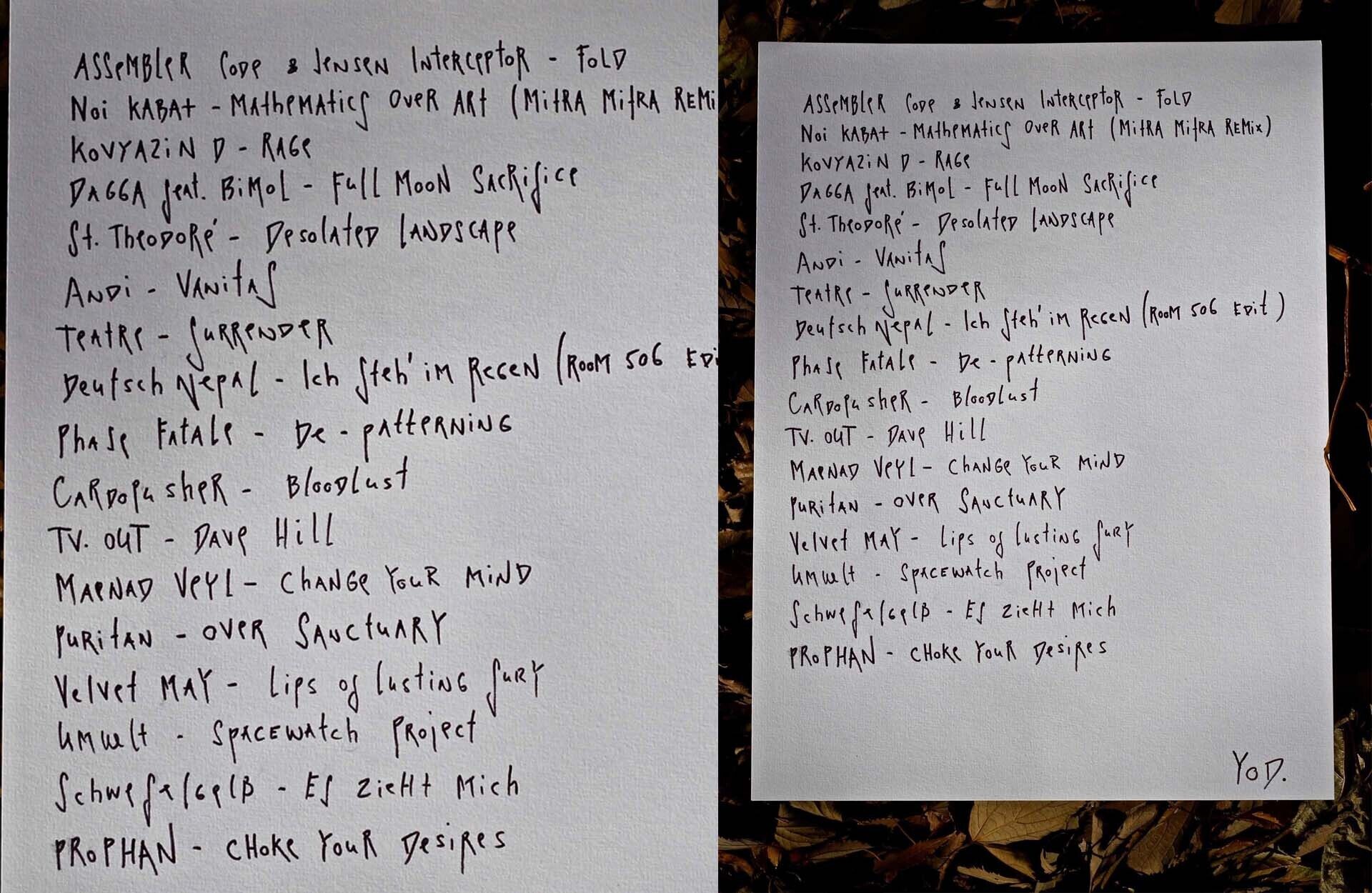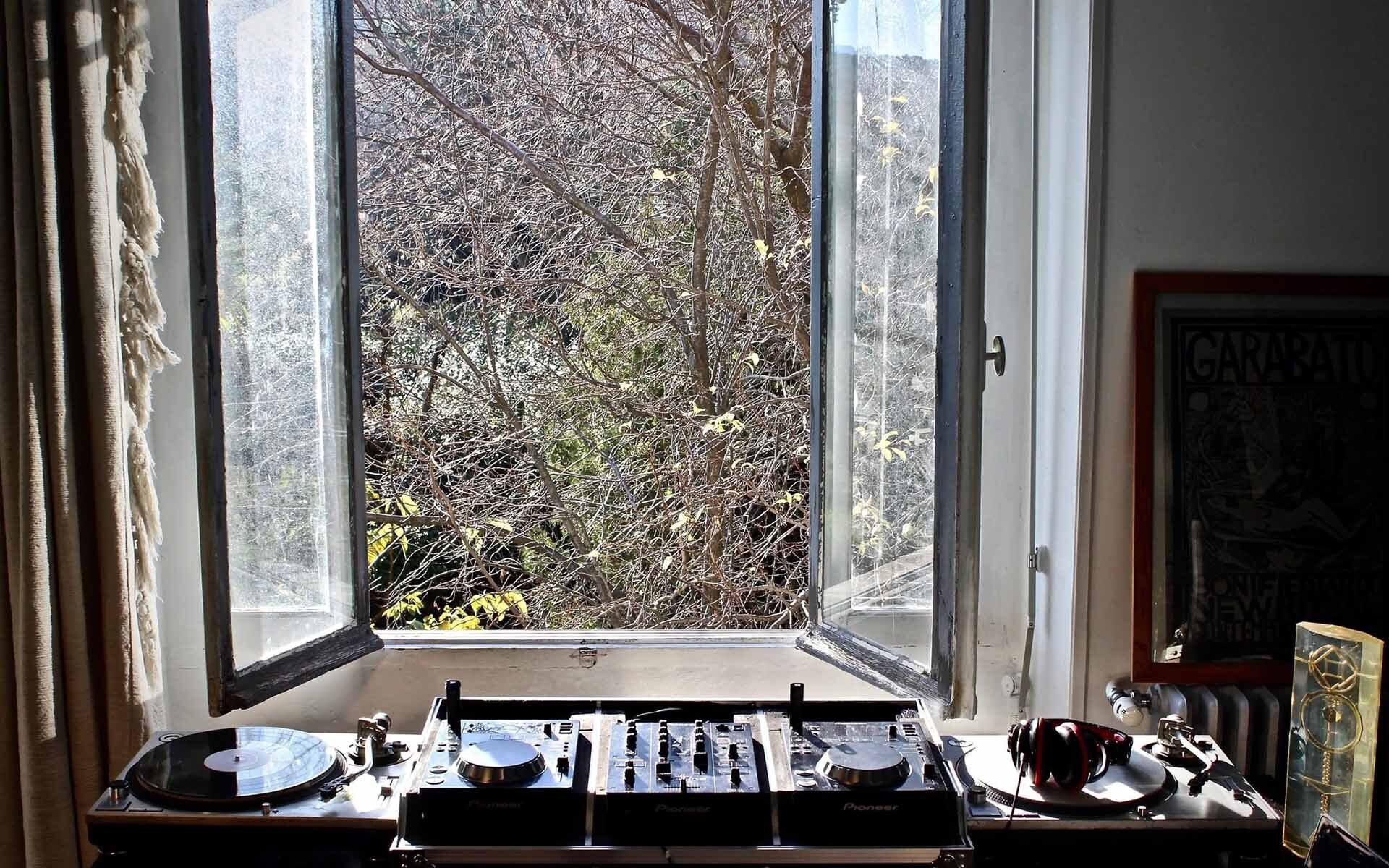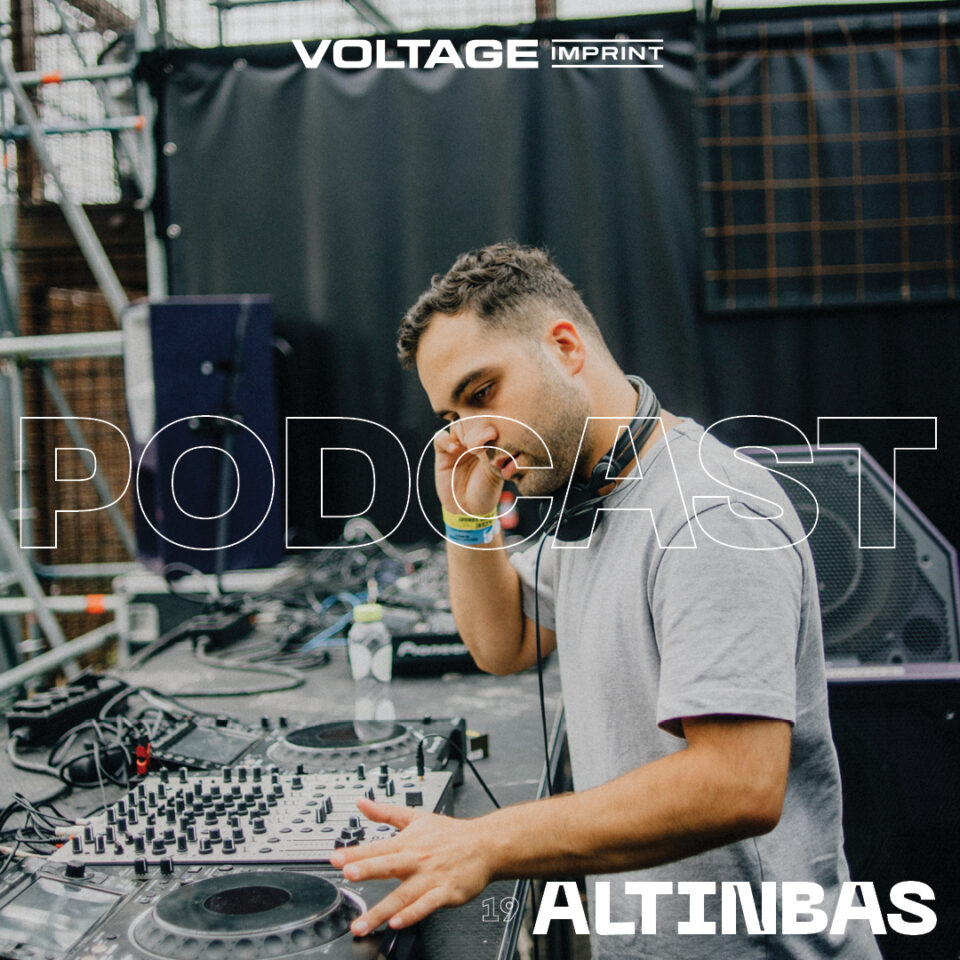VOLTAGE Podcast 22 - Years Of Denial

Tracklist
- Assembler Code & Jensen Interceptor - Fold
- Noi Kabat - Mathematics Over Art (mitra mitra remix)
- Kovyazin D - Rage
- Dagga feat. Bimol - Full Moon Sacrifice
- St. Theodoré - Desolated Landscape
- Andi - Vanitas
- Teatre - Surrender
- Deutsch Nepal - Ich steh' im regen (Room 506 edit)
- Phase Fatale - De-patterning
- Cardopusher - Bloodlust
- TV.OUT - Dave Hill
- Maenad Veyl - Over Sanctuary
- Velvet May - Lips of lusting fury
- Umwelt - Spacewatch Project
- Schwefelgelb - Es zieht mich
- Prophän - Choke your desires
EBM, industrial, wave, drone, it’s all in there and it’s done magnificently well by Jerome Tcherneyan and Barkosina Hanusova. A couple collaboration dating back to about 2016, the two met in the London scene and almost instantly started recording together to start their project on impulse, something that seems to drive their sound through every release since.
With increasing acclaim through each record, the two sent a message with their album on the Italian VEYL recordings ‘Suicide Disco’ that really imposed their sound internationally with tracks like ‘Face to Face’ and ‘I’m Still a Pill’ which are classics at this point.
What’s even more interesting about the two is their ties to the performance art scene and to experimentalism in general - something Hanusova pushes for, having been a multi-faceted artist for quite some time. Frequently utilizing an ever changing live set, Years of Denial alternate between two facades in their work, dance floor and ambiance. With performances as out there as having a subject being tattooed while Tcherneyan resamples the buzzing of the needle over Hanusova’s intimidating voice, their profile stretches over a spectrum of expression that stays within their own universe.
Interview
How did the discussion start between you to start a collaboration? Were there any key words you guys decided on for a style or did things happen in the studio?
B - When we met back in the day, I was making more performance art works and I invited Jerome to create the sound for it. My pieces would contain a lot of spoken words and Jerome would play live music to it; that’s how we realized we could develop it further. We had some studio sessions, experimenting, and improvising.
J - Yeah, I think we had done that once or twice where I was playing music live during the performance just improvising with a modular synth. Then, we thought why wouldn’t we do the same, but towards my music as well - to use vocals on dance beats. I was offered a gig and I thought, should we actually make it happen? So for a week we just wrote tunes on the spot and then played that gig. It was with Broken English Club back in France. Oliver is a good friend, I used to play with him in ‘The Eyes In The Heat’, he’s always been very supportive, and I will always be grateful for it. After our first live gig as YOD we thought we should keep working together, as we both felt something magical and chemical was happening. So then we recorded a few demos and ‘We Operate on Each Other’ was our first release on Death & Leisure -. A Split EP with Thomas (Maenad Veyl)
I imagine the workflow goes pretty fast between you two if you were able to prepare a live set in a week. How do you organize yourselves for the creation of your music - who takes care of what and where do you cross over?
B - I definitely take care of lyrical writing, and the vocals, but also the aspect of performing live on the stage is very important. The actual performance plays a big role in the project. Without stage presence you won’t be able to connect with your audience. Jerome takes care of the music production, and engineering majority of the time. When having studio sessions, together, we search for ideas. Sometimes we begin with vocal or narrative first and sometimes with a sound, once we find something we like we develop it.
J - Barkosina is used to being on stage performing. Same for me, I’ve been doing music for a long time now so it was more about showing each other what we could do and seeing what happens. It wasn’t about ‘you have to do this or that’’ and little by little we fell into our workflow and started to influence each other.
B - Our collaboration has been really spontaneous since the beginning and Jerome producing music for many years, he had time to build his spaceship - his studio. I love to work with something that is immediate, in other words - professional, and that was possible with him because his musical universe was already there. I had a lot to say, and to share, being part of music projects before, I felt this was the right time to fully embrace the musical side of my performance practice. The chemistry between us happened very fast and organically. You can hear it in our first tracks, I think we’re getting better now [laughs]... I mean, we were working with what we had. Poetry and electronic music. Right now we’re developing more song structures and working deeply with that. What was experimentation before is now more of a process that really became a daily dedication…
So Jerome, you produce entirely and Barkosina does the lyrics. Do you ever cross over in your roles?
J - Like Barkosina said, we live together. I’ll start something and she’ll say ‘oh, that’s cool’ so we end up working together that way too. We don’t have finished tracks and then put vocals on them, that’s not how it works. Barkosina comes with lyrics, already made intervals which will dictate the harmony of the music, if she has something more punky we’ll go for moodier or faster tracks. So the influence is back and forth and little by little, we build tracks.
B - … and Jerome is definitely more technically driven, but sometimes he has an idea for lyrics and I’ll have an idea for sounds, patterns or melodies. So we intervene constantly, but with our own individual knowledge. I also think Jerome sold his soul to the machine [Jerome laughs] and I sold my soul to art. Art is a very broad concept. Performance, theatre, poetry, writing, music. My work is interconnected with other art forms, and music has always been there but I couldn't imagine standing by one particular artistic medium only. With music production/engineering you have to be like this mad scientist in your laboratory, who barely eats and sleeps. I can't imagine doing that so to speak Jerome just sold his soul to the machines.
J - [smiles] Apparently…
What are and how do you come up with the themes you propose in your music? Why are these messages important to you?
B- The narrative or the theme is always something really personal. Well the work comes from you, from the artist, so it is personal. It’s about how we perceive the world around us, but also inside us. How we feel, and what we feel. Things that happen to your day-to-day life that people can associate with. Visions, inspirations, notions, things that can touch people. Something deeper, it’s all about drawing your creative soul out of your system and getting it out there. And hopefully people like it. The connection between everyday life and art is the key.
J- Personally, I’ve been listening to new wave and goth since forever. The mood has always been there, my previous band was quite moody as well. With YOD we start documenting everyday life, like this morning we were recording a track about the past fucking two years, you know? Struggling in the studio, we can’t play live… it sucks - and here you have the title for the new track [laughs] …
B - [starts singing] Another year, another crush
bills and bugs piling up like trash
I am jobless and short of cash
I got the feeling I am out of touch [laughs]
You seem really productive… what does a week look like for you both in terms of working on your craft?
B - Everyday, Jerome is in the studio from 9am to 11pm. Every single day.
J - Not just producing but playing with hardware and petting my cat. I’m not recording or trying to make a tune, I just play. I’m always changing the studio; even for our live shows the setup has never been the same twice.
B - For me it’s the same, but not necessarily in the studio only. Living day by day is already hard work. We do our own thing then we’ll meet in between. I write, read, walk, think, feel, listen, all this is part of the process. We are living in this Years Of Denial bubble, that’s all we do. We moved recently to a village and we’ve been living like this since the pandemic. Actually, after the pandemic or before it, nothing changed. We were always living isolated, away from everything, only getting some release through playing live performances. It’s very intense, not great at all times, hardcore dedication, a lifestyle. I guess when you find something good, when your art reaches a certain level there’s no point in leaving it behind, you become it.
J - When the pandemic started, we moved to the Alps. The ski resort was closed, there was nothing - we were alone in the forest.
Where are you living, actually? Because you were living in London.
J - We live close to Marseille.
B - We lived in London for many years, that’s where home is. But creating and living there became financially impossible, we had to make a choice, and so we left the city and moved somewhere we could have a bigger space.
Your music is dark, industrial, and moody - London, or any other large city, seems like the perfect place to be to make music like that. Do you think the change of scenery will have an impact on your music?
B - Living life not just passing through is important for a performer/narrator. The need to search and experience others is crucial, so this empty scenery has been lyrically, and creatively quite difficult for me. Luckily, the world is so fucked up there’s always something to write about, but I don’t have the same living experience - the adrenaline. In terms of the sound, I don’t think there is any impact of living in a rural area.
J - I spent 18 years in London, Barkosina’s been there, what, 12 years before you moved? The vibe is there.
B - The mood won’t change. Also we’re always making sure we create dance music as well as ambient music, so we always have these two projects as escapism. We try to ventilate our energy there. In terms of dance music we’re quite settled so I don’t think that would impact the production. I think Years of Denial has it’s sound now and that won’t change due to the circumstances of living. I think it will be more used in other projects, because we both have solo projects too.
J - Just before the pandemic, we were isolated, but every weekend we’d go to Moscow, Berlin… you still live things.
B - Yes, the aspect of the live gigs and traveling is really important. We were playing in London and Paris recently and it was amazing. Going back to the studio, you get an injection of the energy you need for new works.
J - This, also with the pandemic and Brexit… I want to keep London how I remember it. We met our mates there, our lives were there, and in 3 years it’s changed completely. Personally, I don’t miss it. It’s part of me now, a part of us… now onto the next step.
How did you guys get in contact with Maenad Veyl for his label and what was it like working in collaboration with him for the release of Suicide Disco?
J - Apparently I met Thomas in a club years ago [laughs] Oliver [Broken English Club] wanted us to do a split together for Death&Leisure, we kept in touch and put a track on a V/A for his new born label Veyl. Alex and Thomas are doing a great job with the label, the records are well mastered and packaged and we communicate easily so Veyl was the perfect platform for Suicide Disco.
B - It’s been really great working with Thomas and Alex. It’s been so sweet. Really smooth, the whole aesthetic as well: the cover of the album… Then we collaborated with Thomas on his last album; tracks like Stranger, which has got a more rock n roll, punk feel to it and also Mary’s Dead, which is almost extreme metal.. It’s been so fruitful to work with Thomas, sonically we get to places normally we wouldn’t. He’s great.
During a live performance - what is the ideal setting and mood? Do you have places or events in particular that you prefer?
B - For the scenography, the lighting is really important. It always sets the mood, so we look for dim, red/blue lights. We used to perform next to each other behind our machines facing the audience, but now we face each other, so I can manage both playing my instruments, and perform for the audience. We are able to adapt to later hours - we have a set that’s more ravey for late hours and we have a set that could be played during the early hours. Any place is a favorite place for me if it has a proper stage - if you’re not in a DJ booth. The live performance needs a stage, without it, it won’t work.
J - In the early days when we’d get booked, there was not much space for the live act, nowadays promoters are more aware of what we do, that we need space as it’s part of the whole experience.
What makes a good crowd?
B - Drugs and late hours, I’m not going to lie. [laughs] Everyone needs to be enjoying themselves, of course. The audience is extremely important, and their mood. We know how to break the ice though, it’s easy for us. We know how to start the party.
J - Somehow, we can work with a crowd that can get quite sexy. We fit well in those kinds of atmospheres. We played Gegen/Kaos/Joy, for example and it fits well.
What’s coming up for you guys?
B - We’re working on the second album, hopefully it comes out on time as everything’s delayed. We have solo projects as well. I’m releasing my debut hard-cover book and audio tape about a project I created during the pandemic called ‘Fasting Culture’. Soundwise the tape is an ambient noise audio dairy, and I am very happy about the result. The book is filled with short essays, poetry, manifesto, and photography. It is my magnum opus. And you [looks to Jerome] are releasing Supreme Low, want to talk about it?
J - Well it’s my all-time project. It’s the kind of music I was doing in the nineties when I started to produce. I’m a big fan of Scorn, Techno Animal… slower tempo, very dubby. I’ve done it for years, but never released anything. I recorded a few tracks in London with Sensational (NY/Wordsound) one of my all time favorite MCs and build a mini Lp which Veyl will release in 2022. Barka also features on one track…
B - He invited different vocalists…
J - … Broken English Club is also contributing…
B - There are also remixes from Hypnoskull and Maenad Veyl.
J - 6 tracks and 2 remixes.
B - We’ve also been a part of a load of V/A’s and working on remixes, but we’re mostly focusing on the album.
Next up: Yan Cook LIVE
Editorial Team: Noah Hocker and Michiel Demeulemeester
Interview: Noah Hocker




